County of Nassau
(Princely) County of Nassau Principalities of Nassau | |||||||||
|---|---|---|---|---|---|---|---|---|---|
| 1125–1806 | |||||||||
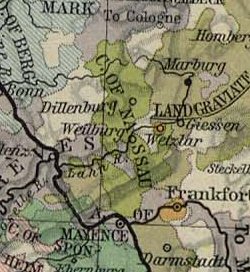 County of Nassau in 1547 | |||||||||
| Status | County | ||||||||
| Capital | Nassau | ||||||||
| Common languages | German (Rhine Franconian dialects, Moselle Franconian dialects) | ||||||||
| Religion | Roman Catholic | ||||||||
| Historical era | Middle Ages | ||||||||
• City founded | 915 | ||||||||
• Rupert I claims title of count | 1125 | ||||||||
• Comital title acknowledged | 1159 | ||||||||
• Partitioned multiple times | 1255–1806 | ||||||||
• Remaining parts unified to form duchy | 1806 | ||||||||
| |||||||||
| Today part of | Germany | ||||||||

The County of Nassau was a German state within the Holy Roman Empire and later part of the German Confederation. Its ruling dynasty, the male line of which is now extinct, was the House of Nassau.
Origins
[edit]Nassau, originally a county, developed on the lower Lahn river in what is known today as Rhineland-Palatinate. The town of Nassau was founded in 915.[1] Dudo of Laurenburg held Nassau as a fiefdom as granted by the Bishopric of Worms. His son, Rupert, built the Nassau Castle there around 1125, declaring himself "Count of Nassau". This title was not officially acknowledged by the Bishop of Worms until 1159 under the rule of Rupert's son, Walram. By 1159, the County of Nassau effectively claimed rights of taxation, toll collection, and justice, at which point it can be considered to become a state.[1]
The Nassauers held the territory between the Taunus and the Westerwald at the lower and middle Lahn. By 1128, they acquired the bailiwick of the Bishopric of Worms, which had numerous rights in the area, and thus created a link between their heritage at the lower Lahn and their possessions near Siegen. In the middle of the 12th century, this relationship was strengthened by the acquisition of parts of the Hesse-Thüringen feudal kingdom, namely the Herborner Mark, the Kalenberger Zent and the Court of Heimau (Löhnberg). Closely linked to this was the "Lordship of Westerwald", also in Nassau's possession at the time. At the end of the 12th century, the House acquired the Reichshof Wiesbaden, an important base in the southwest.
In 1255, after the Counts of Nassau acquired the estates of Weilburg, the sons of Count Henry II divided Nassau for the first time. Walram II received the county of Nassau-Weilburg. From 1328 on, his younger brother, Otto I, held the estates north of the Lahn river, namely the County of Nassau-Siegen and Nassau-Dillenburg. The boundary line was essentially the Lahn, with Otto receiving the northern part of the county with the cities of Siegen, Dillenburg, Herborn and Haiger and Walram retaining the section south of the river, including the cities of Weilburg and Idstein.
County of Nassau-Weilburg
[edit]Walram's son Adolf became King of Germany in 1292. His son Count Gerlach abdicated in 1344 and the county was divided under his sons in 1355
- County of Nassau-Weilburg, again divided from 1442 to 1574
- County of Nassau-Saarbrücken (Elder)
- County of Nassau-Weilburg
- County of Nassau-Wiesbaden, again divided from 1480 to 1509
- County of Nassau-Idstein
- County of Nassau-Wiesbaden
fell back to Nassau-Weilburg in 1605
- County of Nassau-Sonnenberg, partitioned among Nassau-Wiesbaden and Nassau-Weilburg in 1405
In 1605, all parts of Nassau-Weilburg were again unified under Count Louis II; however, after his death in 1627, his sons divided the county again
- County of Nassau-Idstein, fell to Nassau-Ottweiler in 1721
- County of Nassau-Saarbrücken (Younger), divided again in 1640
- County of Nassau-Saarbrücken, fell to Nassau-Ottweiler in 1723
- County of Nassau-Ottweiler, fell to Nassau-Usingen in 1728
- County of Nassau-Usingen, Principality in 1688
- County of Nassau-Weilburg (Younger)
After Nassau-Usingen had inherited Nassau-Ottweiler with former Nassau-Idstein and Nassau-Saarbrücken, it was reunified with Nassau-Weilburg and raised to the Duchy of Nassau in 1806.
County of Nassau-Dillenburg
[edit]After the death of Count Otto I, his county was divided between his sons in 1303:
- County of Nassau-Dillenburg, fell to Nassau-Siegen in 1328
- County of Nassau-Hadamar (Elder), fell to Nassau-Dillenburg in 1394
- County of Nassau-Siegen, called Nassau-Dillenburg from 1328 on, again got divided from 1341 to 1561:
- County of Nassau-Beilstein (Elder)
- County of Nassau-Dillenburg (Elder)–1606)
In 1504, Henry III of Nassau-Dillenburg inherited the county's estates at Breda in the Duchy of Brabant, while his younger brother William became Count of Nassau-Dillenburg in 1516. After the son of Henry III, René of Châlon died in 1544, Count William's eldest son William the Silent became Prince of Orange and Lord of Breda, Stadtholder in the Low Countries from 1559 on. His younger brother, John VI, again reunited all Nassau-Dillenburg possessions in 1561, though the county was again divided after his death in 1606.
- County of Nassau-Hadamar (Younger), Principality in 1650, fell to Nassau-Diez in 1743
- County of Nassau-Siegen, (1607–23), again got divided from 1623 to 1734:
- County of Nassau-Siegen (Protestant), Principality in 1664, became extinct in 1734
- County of Nassau-Siegen (Catholic), Principality, fell to Nassau-Diez in 1743
- County of Nassau-Dillenburg, fell to Nassau-Beilstein in 1620
- County of Nassau-Beilstein (Younger), called Nassau-Dillenburg (Younger) from 1620 on, Principality in 1652, fell to Nassau-Dietz in 1739
- County of Nassau-Dietz, fell to Joachim Murat's Grand Duchy of Berg after the dissolution of the Holy Roman Empire in 1806
The Counts of Nassau-Dietz, descendants of William Frederick were stadtholders of Friesland, Groningen and Drenthe and Princes of Orange from 1702 on. When they lost their Dutch possessions during the Napoleonic Wars, they were compensated with the Principality of Nassau-Orange-Fulda. Though they lost their German possessions in 1806, the House of Orange-Nassau, through female succession, was the reigning house of the Grand Duchy of Luxembourg until 1890 and is still the royal house of the Netherlands.
Rulers
[edit]Partitions of Nassau under House of Nassau rule
[edit]| County of Laurenburg/ Nassau (1093-1255) | |||||||||||||||||||||||||||||
 County of Northern Nassau (Ottonian Line) (1255-1303) |
 County of Southern Nassau (Walramian Line) (1255-1355) | ||||||||||||||||||||||||||||
| County of Dillenburg (1st creation) (1303-1328) |
County of Hadamar (1st creation) (1303-1394) | ||||||||||||||||||||||||||||
| County of Beilstein (1343-1561) |
|||||||||||||||||||||||||||||
| County of Sonnenberg (1355-1404) |
|||||||||||||||||||||||||||||
 County of Weilburg (1355-1806) | |||||||||||||||||||||||||||||
| County of Siegen (1303-1652/64) |
 Barony of Breda (1403-1544) Renamed as:  Principality of Orange-Nassau (1st creation, Siegen-Breda line) (1544-1702)[2] |
County of Wiesbaden-Idstein (1st creation) (1355-1605) (divided 1370-86; 1480-1509; 1554-56; 1564-66) | |||||||||||||||||||||||||||
 County of Saarbrücken (1st creation) (1429-1574) | |||||||||||||||||||||||||||||
| County of Hadamar (2nd creation) (1620-1650) Raised to: Principality of Hadamar (1650-1711) |
(In 1623 divided in Catholic and Protestant ruling lines) Both lines raised to: Catholic Principality of Siegen (1652-1743) and  Protestant Principality of Siegen (1664-1734) |
||||||||||||||||||||||||||||
| County of Idstein (2nd creation) (1627-1688) Raised to: Principality of Idstein (1688-1721) | |||||||||||||||||||||||||||||
| County of Ottweiler (1659-1721) |
|||||||||||||||||||||||||||||
 County of Dillenburg (2nd creation) (1606-1654) Raised to:  Principality of Dillenburg (1654-1739) |
|||||||||||||||||||||||||||||
 County of Dietz (1606-1654) Raised to:  Principality of Dietz (1654-1702) |
 County of Saarbrücken (2nd creation) (1627-1728) | ||||||||||||||||||||||||||||
Renamed as: Principality of Orange-Nassau (2nd creation, Dietz line) (1702-1806) |
County of Usingen (1659-1688) Raised to: Principality of Usingen (1688-1806) | ||||||||||||||||||||||||||||
| Principality of Saarbrücken (1741-1797) | |||||||||||||||||||||||||||||
| Annexed by France | |||||||||||||||||||||||||||||
 Principality of Orange-Nassau (2nd creation, Dietz line) (1813-1815) |
Duchy of Nassau (1806-1866) | ||||||||||||||||||||||||||||
| Annexed by Prussia | |||||||||||||||||||||||||||||
Table of rulers
[edit]| Ruler | Born | Reign | Ruling part | Consort | Death | Notes | ||
|---|---|---|---|---|---|---|---|---|
| Dudo | ? | 1093 – 1117 | County of Laurenburg/ Nassau |
Irmgard/Demudis of Arnstein three children |
c.1117 | Founder of the family and the county. | ||
| Rupert I | c.1090 First son of Dudo and Irmgard/Demudis of Arnstein |
1117 – 1154 | County of Laurenburg/ Nassau |
Beatrix of Limburg before 1135 four children |
c.1154 aged c.63/64 |
Sons of Dudo, ruled jointly. Arnold abdicated from the co-regency. | ||
| Arnold I | c.1090 Second son of Dudo and Irmgard/Demudis of Arnstein |
1117 – 1148/50 | Unmarried | c.1148/50 aged c.58-60 | ||||
| Rupert II | c.1120 First son of Rupert I and Beatrix of Limburg |
1154 – 1159 | County of Laurenburg/ Nassau |
Beatrix at least two children |
c.1159 aged c.38-39 |
Sons of Rupert I, ruled jointly. | ||
| Arnold II | c.1137 Second son of Rupert I and Beatrix of Limburg |
Unknown at least one child |
c.1159 aged c.21-22 | |||||
| Regency of Beatrix of Limburg (1159-1160) | Cousins, ruled together. Rupert III, Arnold II's son, co- ruled with Henry I, Rupert II's son. In 1167, Henry I died in Rome during the August 1167 epidemic (after the Battle of Monte Porzio). His death made his brother Waleran replace him in the co-regency. In 1191, Rupert III's death made his son Herman the new co-regent, but he abdicated the next year. In 1193, Waleran I (then already sole ruler) would become the first legalized Count of Nassau. | |||||||
| Rupert III the Bellicose | c.1130/40? Son of Arnold II |
1159 – 23/28 December 1191 | County of Laurenburg/ Nassau |
Elysa of Leiningen 1169 two children |
23/28 December 1191 aged c.51-61 | |||
| Henry I | c.1140 First son of Rupert II and Beatrix |
1159 – August 1167 | Unmarried | August 1167 Rome aged c.26/27 | ||||
| Waleran I | 1146 Second son of Rupert II and Beatrix |
August 1167 – 1 February 1198 | Kunigunde of Ziegenhain before 1135 four children |
1 February 1198 aged 51/52 | ||||
| Herman | c.1170 Son of Rupert III and Elysa of Leiningen |
23/28 December 1191 – 1192 | Unmarried | c.1210? aged c.39/40? | ||||
| Henry II the Rich | c.1180 First son of Waleran I and Kunigunde of Ziegenhain |
1 February 1198 – 26 April 1250 | County of Nassau | Matilda of Guelders before 1221 eleven children |
26 April 1250 aged c.69/70 |
Sons of Waleran I, ruled together. From 1230 to 1240, Rupert was a Knight of the Teutonic Order. | ||
| Rupert IV | c.1180 Second son of Waleran I and Kunigunde of Ziegenhain |
1 February 1198 – 1230 | Gertrude of Isenburg-Cleeberg c. 11 December 1215 no children |
c.1239 aged c.58/59 | ||||
| Henry II's sons, Waleran II and Otto I, who were ruling together, split the Nassau possessions on 17 December 1255, by a treaty called Prima divisio, which determined the Lahn river as border of the two halves: to the south, called Southern Nassau, was ruled by Waleran and his descendants, who became known as the Walramian Line, which became important in the County of Nassau and Luxembourg; to the north, called Northern Nassau the county was ruled by Otto and his descendants, who became known as the Ottonian Line, which would inherit parts of Nassau, France and the Netherlands. | ||||||||
| Waleran II | 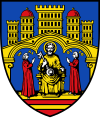
|
c.1220 First son of Henry II and Matilda of Guelders |
26 April 1250 – 16 December 1255 | County of Nassau | Adelaide of Katzenelnbogen before 1250 seven children |
24 January 1276 aged c.55/56 |
Children of Henry II, ruled jointly until 1255, when they issued the Prima divisio, regulating their division of lands:
| |
| 16 December 1255 – 24 January 1276 | Southern Nassau | |||||||
| Otto I | 1224 Second son of Henry II and Matilda of Guelders |
26 April 1250 – 16 December 1255 | County of Nassau | Agnes of Leiningen before 1270 five children |
between 3 May 1289 and 19 March 1290 aged c.64-66 | |||
| 16 December 1255 – 1289/90 | Northern Nassau | |||||||
| Adolf I | 
|
1255 Second son of Waleran II and Adelaide of Katzenelnbogen |
24 January 1276 – 2 July 1298 | County of Southern Nassau | Imagina of Isenburg-Limburg 1270 eight children |
2 July 1298 Göllheim aged 42/43 |
In 1292 was crowned King of Germany. | |
| Henry I[3] | 
|
c.1270 First son of Otto I, Count of Nassau and Agnes of Leiningen |
1289/90 – 1303 | County of Northern Nassau | Adelaide of Sponheim-Heinsberg 1302 five children |
July/August 1343 aged 72/73 |
Sons of Otto I, ruled together until 1303, when they divided the land: Henry received Nassau-Siegen
(Siegen, Ginsberg, Haiger, and the Westerwald), Emicho received Nassau-Hadamar and John received Nassau-Dillenburg. However, after the childless death of John, Nassau-Dillenburg (and the towns of Dillenburg, Herborn, and Beilstein) fell to Nassau-Siegen, which adopted the name Nassau-Dillenburg. Siegen and Dillenburg were united until 1606. | |
| 1303 – July/August 1343 | County of Siegen | |||||||
| Emicho I | c.1285 Second son of Otto I, Count of Nassau and Agnes of Leiningen |
1289/90 – 1303 | County of Northern Nassau | Anna of Nuremberg before 1297 eight children |
7 June 1334 aged 48-49 | |||
| 1303 – 7 June 1334 | County of Hadamar | |||||||
| John | c.1285 Fourth son of Otto I, Count of Nassau and Agnes of Leiningen |
1289/90 – 1303 | County of Northern Nassau | Unmarried | 10 August 1328 aged 42-43 | |||
| 1303 – 10 August 1328 | County of Dillenburg | |||||||
| Nassau-Dillenburg was annexed to Nassau-Siegen | ||||||||
| Imagina of Isenburg-Limburg | 
|
1255 Limburg an der Lahn Daughter of Gerlach IV, Count of Isenburg-Limburg and Imagina of Blieskastel |
2 July 1298 – 29 September 1313 | County of Southern Nassau (at Weilburg) |
Adolph I 1270 eight children |
29 September 1313 Wiesbaden aged 57–58 |
While Adolf's widow, Imagina, received a seat at Weilburg (which after her death returned to the family), the children of the couple ruled jointly. Waleran abdicated in 1316, and in 1344 Gerlach did the same to pass the rule to his two elder sons, as his brothers didn't have male heirs. | |
| Rupert V | 1280 Second son of Adolph I and Imagina of Isenburg-Limburg |
2 July 1298 – 2 November 1304 | County of Southern Nassau | Unmarried | 2 November 1304 aged 23/24 | |||
| Gerlach I | 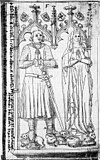
|
1285 Third son of Adolph I and Imagina of Isenburg-Limburg |
2 July 1298 – 1344 | Agnes of Hesse 1307 seven children Irmgard of Hohenlohe-Weikersheim before 4 January 1337 two children |
7 January 1361 Wiesbaden-Sonnenberg (?) aged 75/76 | |||
| Waleran III | 1294 Fifth son of Adolph I and Imagina of Isenburg-Limburg |
2 July 1298 – 1316 | Unmarried | 22 December 1324 aged 29/30 | ||||
| John | c.1305 First son of Emicho I and Anna of Nuremberg |
7 June 1334 – 20 January 1365 | County of Hadamar | Elisabeth of Waldeck 1331 ten children |
20 January 1365 aged c.59/60 |
Children of Emicho I, ruled jointly. | ||
| Emicho II | c.1305 Second son of Emicho I and Anna of Nuremberg |
7 June 1334 – 1 March 1359 | Anna of Diez no children |
1 March 1359 aged c. 53/54 | ||||
| Otto II | 
|
1305 First son of Henry I and Adelaide of Sponheim-Heinsberg |
July/August 1343 – December 1350 or January 1351 | County of Siegen | Adelaide of Vianden 23 December 1331 three children |
December 1350/January 1351 |
Children of Henry I, divided the land: Otto inherited Siegen and Dillenburg, and Henry inherited Beilstein, partitioned from Dillenburg. | |
| Henry I | 1307 Second son of Henry I and Adelaide of Sponheim-Heinsberg |
July/August 1343 – 28 October 1378 | County of Beilstein | Imagina of Westerburg 1339 three children |
28 October 1378 Beilstein aged 70/71 | |||
| Adelaide of Vianden | 
|
c.1310 Daughter of Philip II, Count of Vianden and Adelaide of Arnsberg |
December 1350 or January 1351 – 30 September 1376 | County of Siegen (in Mengerskirchen and Tringenstein) |
Otto II 23 December 1331 three children |
30 September 1376 Mengerskirchen (?) aged c.65/66 |
Heirs of Otto II. Adelaide, as Otto's widow, received seats Mengerskirchen and Tringenstein, while serving also as regent for her son John. After John attained majority, she continued her rule in her designated seats. During his long reign, John made lucrative acquisitions of various kinds and expanded the possessions of his family. | |
| Regency of Adelaide of Vianden (1351-1362) | ||||||||
| John I | 1339 Son of Otto II and Adelaide of Vianden |
December 1350 or January 1351 – 4 September 1416 | County of Siegen | Margaret of the Mark 30 November 1357 five children |
4 September 1416 Herborn aged 76/77 | |||
| Adolph I | 
|
1307 First son of Gerlach I, Count of Nassau and Agnes of Hesse |
1344 – 25 November 1355 | County of Southern Nassau | Margaret of Nuremberg 1322 fourteen children |
17 January 1370 Idstein aged 62/63 |
Children of Gerlach I. The eldest two (Adolph and John) ruled first together in Nassau. In 1355, they formalized a division of the land between them and their other brothers:
| |
| 25 November 1355 – 17 January 1370 | County of Idstein | |||||||
| John I | 
|
1309 Second son of Gerlach I, Count of Nassau and Agnes of Hesse |
1344 – 25 November 1355 | County of Southern Nassau | Gertrude of Merenberg 1333 one child Johanna of Saarbrücken 1353 seven children |
20 September 1371 Weilburg aged 61/62 | ||
| 25 November 1355 – 20 September 1371 | County of Weilburg | |||||||
| Crato | c.1340 First son of Gerlach I, Count of Nassau and Irmgard of Hohenlohe-Weikersheim |
25 November 1355 – 19 September 1356 | County of Sonnenberg | Unmarried | 19 September 1356 Poitiers aged c.15/16 | |||
| Rupert (VI) the Warrior | c.1340 Second son of Gerlach I, Count of Nassau and Irmgard of Hohenlohe-Weikersheim |
19 September 1356 – 4 September 1390 | County of Sonnenberg | Anna of Nassau-Hadamar 1362 no children |
4 September 1390 Kirchheimbolanden aged c.49/50 | |||
| Elisabeth of Waldeck | c.1305 Daughter of Henry IV, Count of Waldeck and Adelaide of Cleves |
1365 – 1381 | County of Hadamar (at Ems) |
John 1331 ten children |
c.1381 Ems (?) aged 75/76 |
Heirs of John. Elisabeth, as widow, ruled at Ems; the county was shared by their two children: Henry and Emicho. The mental disorder of Emicho led to an establishment of a regency led by his brother-in-law, Rupert, Count of Nassau-Sonnenberg, and probably then his widow, Emicho's sister Anna. Neither Emicho nor Henry left descendants, and the county was thus inherited by Anna. | ||
| Henry | c.1335 Hadamar Fourth son of John and Elisabeth of Waldeck |
1365 – 1368 | County of Hadamar | Unmarried | 1368 Hadamar aged c. 32/33 | |||
| Emicho III | c.1335 Hadamar Fifth son of John and Elisabeth of Waldeck |
1365 – 1394 | 1394 Hadamar aged c. 58/59 | |||||
| Gerlach II | 
|
1333 First son of Adolph I and Margaret of Nuremberg |
17 January 1370 – 1386 | County of Idstein | Agnes of Veldenz c.1360 no children |
1386 Idstein (?) aged 52/53 |
Children of Adolph I, divided the land: Gerlach kept Idstein and Waleran inherited Wiesbaden. Waleran reunited Idstein after his brother's death. | |
| Waleran IV | 
|
1348 or 1354 Sixth son of Adolph I and Margaret of Nuremberg |
17 January 1370 – 7 November 1393 | County of Idstein (At Wiesbaden 1370-86) |
Bertha of Westerburg 1374 two children |
7 November 1393 Wiesbaden (?) aged 38/39 or 44/45 | ||
| Joanna of Saarbrücken | 1330 Saarbrücken First daughter of John II, Count of Saarbrücken and Ghislette of Bar-Pierrefort |
20 September 1371 – October 1381 | County of Weilburg (at Neuweilnau) |
John I, Count of Nassau-Weilburg 1353 seven children |
October 1381 Neuweilnau (?) aged 50/51 |
Joanna held her estate at Neuweilnau until her death; while providing the regency for her son on the rest of Weilburg; At his death, Philip would divide the land for his sons: the eldest received Nassau-Weilburg; the youngest, her original county of Saarbrücken. | ||
| Regencies of Joanna of Saarbrücken (1371-1381) and Frederick of Blankenheim, Bishop of Strasbourg (1381-1382) | ||||||||
| Philip I | 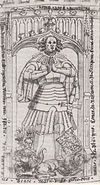
|
1368 Weilburg Son of John I and Joanna of Saarbrücken |
20 September 1371 – 2 July 1429 | County of Weilburg | Anna of Hohenlohe-Weikersheim 1385 one child Elisabeth of Lorraine-Vaudémont 1412 four children |
2 July 1429 Wiesbaden aged 60/61 | ||
| Henry II | c.1340 Beilstein First son of Henry I, Count of Nassau-Beilstein and Imagina of Westerburg |
24 February 1378 – 12 October 1412 | County of Beilstein | Catherine of Randerode 1383 four children |
12 October 1412 Beilstein aged 71/72 |
Sons of Henry I, ruled jointly. | ||
| Rainhard | c.1345 Beilstein Second son of Henry I, Count of Nassau-Beilstein and Imagina of Westerburg |
24 February 1378 – c.1415 | Unmarried | c.1415 aged c.69/70? | ||||
| Anna | 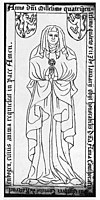
|
c.1350 Hadamar Second daughter of John, Count of Nassau-Hadamar and Elisabeth of Waldeck |
4 September 1390 – 21 January 1404 | County of Sonnenberg | Rupert, Count of Nassau-Sonnenberg 1362 no children |
21 January 1404 Wiesbaden-Sonnenberg aged 53/54 |
Heir of her husband and her brother. In 1403, renounced the claims over Hadamar and, after her own death, Sonnenberg went to Weilburg line. | |
| 1394-1403 | County of Hadamar | |||||||
| Nassau-Hadamar was annexed to Nassau-Siegen | ||||||||
| Nassau-Sonnenberg was annexed to Nassau-Weilburg | ||||||||
| Regency of Bertha of Westerburg (possibly[4]) (1393-c.1400) | ||||||||
| Adolph II | 
|
1386 Son of Waleran IV, Count of Nassau-Idstein and Bertha of Westerburg |
7 November 1393 – 16 July 1426 | County of Idstein | Margaret of Baden March 1418 six children |
16 July 1426 aged 39/40 | ||
| John I | c.1400? First son of Henry I and Catherine of Randerode |
1414/18 – July 1473 | County of Beilstein | Matilda of Isenburg-Grenzau 1415 four children Johanna von Gemen 1477 one child |
July 1473 aged 72/73 |
Sons of Henry II, ruled jointly. | ||
| Henry III | c.1400? Third son of Henry I and Catherine of Randerode |
1414/18 – 12 September 1477 | County of Beilstein | Unmarried | 12 September 1477 aged 76/77 | |||
| Adolph I | 1362 Dillenburg First son of John I, Count of Nassau-Siegen and Margaret of the Mark |
1388 – 12 June 1420 | County of Diez | Judith of Diez (d.14 August 1397) 1384 one child Kunigunde of Isenburg-Limburg (d.15 March 1403) 1402 no children |
12 June 1420 Diez (?) aged 57/58 |
Sons of John I, ruled jointly, as Tetrarchs. Counts Adolph and Engelbert inherited via his wives half of Diez and Breda, respectively, which became, after their deaths, part of Nassau patrimony. | ||
| 4 September 1416 – 1420 | County of Siegen | |||||||
| John II with the Helmet | c.1365 Dillenburg Second son of John I, Count of Nassau-Siegen and Margaret of the Mark |
4 September 1416 – May 1443 | County of Siegen | Unmarried | May 1443 Dillenburg | |||
| Engelbert I | 
|
1370 Dillenburg Third son of John I, Count of Nassau-Siegen and Margaret of the Mark |
1403 – 3 May 1442 | Barony of Breda | Johanna van Polanen 1 August 1403 Breda six children |
3 May 1442 Breda aged 71/72 | ||
| 4 September 1416 – 3 May 1442 | County of Siegen | |||||||
| John III the Younger | 1398 Dillenburg Fifth son of John I, Count of Nassau-Siegen and Margaret of the Mark |
4 September 1416 – 18 April 1430 | County of Siegen | Unmarried | 18 April 1430 Siegen (?)aged 31/32 | |||
| Judith | c.1385 Siegen or Diez Daughter of Adolf I, Count of Nassau-Siegen and Judith of Diez |
12 June 1420 – 2 August 1424 | County of Diez | Godfried VII, Lord of Eppstein-Münzenberg 1401 five children |
2 August 1424 aged 38/39 |
Inherited half of Diez (the other part was inherited by her uncles) and after her death passed to the Eppstein family. Nassau-Siegen eventually recovered parts of her share of Diez in 1530. | ||
| Diez annexed to County of Eppstein; Recovered to Nassau-Siegen in 1530 | ||||||||
| Regency of Margaret of Baden (1426-1433) | ||||||||
| John II | 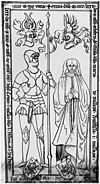
|
1419 Wiesbaden or Idstein Son of Adolph II and Margaret of Baden |
16 July 1426 – 9 May 1480 | County of Idstein | Maria of Nassau-Siegen 17 June 1437 Breda six children |
9 May 1480 Wiesbaden or Idstein aged 60/61 | ||
| Regency of Elisabeth of Lorraine-Vaudémont (1429–1438) | Sons of Philip I, Philip II and John II divided their inheritance. Philip II was the eldest and received Nassau-Weilburg; John received Saarbrücken. Between 1464 and 1490, Philip II also served as regent for count John Louis in Saarbrücken, together with Duke Eberhard I of Württemberg, following the death of the count's mother and previous regent. Philip II also associated,later in his reign, his own son, John III, who predeceased him. | |||||||
| Philip II | 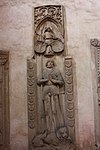
|
12 March 1418 Weilburg First son of Philip I and Elisabeth of Lorraine-Vaudémont |
2 July 1429 – 19 March 1492 | County of Weilburg | Margaret of Loon-Heinsberg 25 September 1440 two children Veronica of Sayn-Wittgenstein 1477 no children |
19 March 1492 Mainz aged 74 | ||
| John III | 
|
27 June 1441 Weilburg Son of Philip II and Margaret of Loon-Heinsberg |
1472 – 15 July 1480 | Elisabeth of Hesse, the Handsome 1464 two children |
15 July 1480 Weilburg aged 39 | |||
| John II | 
|
4 April 1423 Saarbrücken Second son of Philip I, Count of Nassau-Weilburg and Elisabeth of Lorraine-Vaudémont |
2 July 1429 – 15 July 1472 | County of Saarbrücken | Johanna of Loon-Heinsberg 30 November 1456 two children Elisabeth of Württemberg-Urach 30 October 1470 one child |
15 July 1472 Vehingen aged 49 | ||
| John IV | 
|
1 August 1410 Breda First son of Engelbert I and Johanna van Polanen |
3 May 1442 – 3 February 1475 | Barony of Breda | Mary of Looz-Heinsberg 7 February 1440 six children |
3 February 1475 Dillenburg aged 64 |
Sons of Engelbert I, ruled jointly in Breda and Dillenburg until 1447. In this year they divided their lands: John kept Breda and Henry, Dillenburg. After the latter's death, the former reunited their possessions. Their sister Maria inherited some unknown possessions in the Netherlands (possibly in Breda), which she contested with her brother John,[5] and possibly passed to Nassau-Idstein. | |
| 3 May 1442 – 22 February 1447 18 January 1451 – 3 February 1475 |
County of Siegen | |||||||
| Maria | 
|
2 February 1418 Breda Second daughter of Engelbert I and Johanna van Polanen |
3 May 1442 – 11 October 1472 | Barony of Breda | John II 17 June 1437 Breda six children |
11 October 1472 Idstein aged 54 | ||
| Henry II | 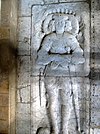
|
7 January 1414 Dillenburg Second son of Engelbert I and Johanna van Polanen |
3 May 1442 – 22 February 1447 | Barony of Breda | Genoveva of Virneburg 1435 one child Irmgard of Schleiden-Junkerath after 1437 no children |
18 January 1451 Radicofani aged 37 | ||
| 3 May 1442 – 18 January 1451 | County of Siegen | |||||||
| Margaret | 1415 Dillenburg First daughter of Engelbert I and Johanna van Polanen |
3 May 1442 – 27 May 1467 | County of Siegen (at Burbach) |
Dietrich, Count of Sayn 24 November 1435 no children |
27 May 1467 aged 51/52 | |||
| Elisabeth | 19 October 1459 Saarbrücken First daughter of John II and Johanna of Loon-Heinsberg |
15 July 1472 – 9 March 1479 | County of Saarbrücken (at Heinsberg, Diest, Zichem and Zeelhem) |
William IV, Duke of Jülich-Berg 19 October 1472 Saarbrücken no children |
9 March 1479 aged 19 |
Children of John II. John Louis inherited the county in general, and his sister Elisabeth received a particular rule over a group of towns, which, after her death with no descendants, was resold by her husband to the House of Nassau, but to the Breda branch. | ||
| Regencies of Elisabeth of Württemberg-Urach and Eberhard I, Duke of Württemberg (1472-1474), and Philip II, Count of Nassau-Weilburg (1474-1490) | ||||||||
| John Louis | 
|
19 October 1472 Saarbrücken Son of John II and Elisabeth of Württemberg-Urach |
15 July 1472 – 4 June 1545 | County of Saarbrücken | Elisabeth of Palatinate-Zweibrücken 29 January 1492 Saarbrücken six children Catharina van Meurs-Saarwerden 14 February 1507 nine children |
4 June 1545 Saarbrücken aged 72 | ||
| Engelbert II the Valorious | 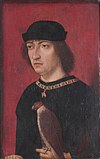
|
17 May 1451 Breda First son of John IV and Maria of Looz-Heinsberg |
3 February 1475 – 31 May 1504 | Barony of Breda | Cymburgis of Baden 19 December 1468 Koblenz no children |
31 May 1504 Brussels aged 53 |
Children of John IV, divided the land: Engelbert inherited Breda in the Netherlands (with the towns of Lek, Diest, Roosendaal en Nispen, Wouw, and Vianden) and John inherited Dillenburg (with the towns of Dillenburg, Siegen, Hadamar, Herborn, Vianden, Dietz). Both brothers were also Governor of the Habsburg Netherlands: Engelbert was a Stadtholder in Flanders (1499-1506) and Artois (1500-1504); John was Stadtholder in Guelders (1504-1505). Engelbert left no descendants, being succeeded by John's eldest son Henry III. | |
| John V | 9 November 1455 Breda Second son of John IV and Maria of Looz-Heinsberg |
3 February 1475 – 30 July 1516 | County of Siegen | Elisabeth of Hesse-Marburg 11 February 1481 six children |
30 July 1516 Siegen aged 60 | |||
| Henry IV | 1449 Beilstein Son of John I and Johanna von Gemen |
12 September 1477 – 26 May 1499 | County of Beilstein | Eva of Sayn 1464 ten children |
26 May 1499 Beilstein aged 49/50 |
|||
| Adolph III | 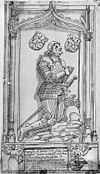
|
10 November 1443 Wiesbaden Second son of John II and Maria of Nassau-Siegen |
9 May 1480 – 6 July 1511 | County of Idstein (At Wiesbaden 1480-1509) |
Margaret of Hanau-Lichtenberg 20 June 1484 four children |
6 July 1511 Wiesbaden aged 67 |
Children of John II, divided the land: Philip kept Idstein and Adolph inherited Wiesbaden. Once more, the holder of Wiesbaden reunited the county. Adolph was also Stadtholder in Guelders (1481-1492). | |
| Philip (I) | 1450 Idstein Fourth son of John II and Maria of Nassau-Siegen |
9 May 1480 – 16 June 1509 | County of Idstein (At Idstein proper) |
Margaret of Palatinate-Zweibrücken 1470 no children |
16 June 1509 Idstein aged 58/59 | |||
| Louis I | 
|
1473 Son of John III and Elisabeth of Hesse |
19 March 1492 – 28 May 1523 | County of Weilburg | Maria Margaretha of Nassau-Wiesbaden-Idstein 19 April 1501 six children |
28 May 1523 Weilburg aged 49/50 |
||
| John II | 1475 Beilstein First son of Henry IV and Eva of Sayn |
26 May 1499 – 18 August 1513 | County of Beilstein | Maria of Solms-Braunfels 1492 four children Anna of Lippe 1510 no children |
18 August 1513 Beilstein aged 37/38 |
Children of Henry IV, ruled jointly. | ||
| Bernard | 1479/85 Beilstein Third son of Henry IV and Eva of Sayn |
26 May 1499 – 10 May 1556 | Unmarried | 10 May 1556 Liebenscheid aged 70/71 or 76/77 | ||||
| Henry III | 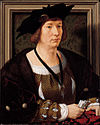
|
12 January 1483 Siegen First son of John V, Count of Nassau-Siegen and Elisabeth of Hesse-Marburg |
31 May 1504 – 14 September 1538 | Barony of Breda | Louise-Françoise of Savoy 3 August 1503 no children Claudia of Chalon May 1515 one child Mencía de Mendoza 26 June 1524 one child |
14 September 1538 Breda aged 55 |
Son of John V, inherited Nassau-Breda from his uncle Engelbrecht II. Also Stadtholder in Holland, Zeeland and Utrecht (1515-1521). | |
| Philip I the Elder | 
|
26 April 1492 Cologne Son of Adolph III and Margaret of Hanau-Lichtenberg |
6 July 1511 – 1554 | County of Idstein | Adriana of Glymes 24 August 1514 Bergen op Zoom six children |
6 June 1558 Idstein aged 66 |
Abdicated for his children, who divided the land once more. | |
| John III | 17 November 1495 Beilstein Son of John II and Maria of Solms-Braunfels |
10 May 1556 – 13 December 1561 | County of Beilstein | Anna of Nassau-Weilburg 1523 no children |
13 December 1561 Beilstein aged |
Ruled with his uncle, Bernard, since 18 August 1513 (his father's death). Had no descendants and after his death the county was annexed to Nassau-Dillenburg. | ||
| Nassau-Beilstein merged again in Nassau-Siegen | ||||||||
| Elisabeth of Hesse-Marburg | May 1466 Marburg First daughter of Henry III, Landgrave of Upper Hesse and Anna of Katzenelnbogen |
30 July 1516 – 7/17 January 1523 | County of Siegen (at Tringenstein) |
John V 11 February 1481 six children |
7 or 17 January 1523 Cologne aged 56 |
Heirs of John V. William inherited Nassau-Siegen, and gave his mother a seat at Tringenstein. During William's reign (1530), parts of Judith's half of Dietz were recovered. From 1557 he obtained the County of Katznelnbogen. | ||
| William I the Rich | 
|
10 April 1487 Dillenburg Fourth son of John V and Elisabeth of Hesse-Marburg |
30 July 1516 – 6 October 1559 | County of Siegen | Walburga of Egmont 29 October 1519 Koblenz two children Juliana of Stolberg 29 September 1531 Königstein twelve children |
6 October 1559 Dillenburgaged 72 | ||
| Philip III | 20 September 1504 Weilrod Son of Louis I and Maria Margaretha of Nassau-Idstein |
28 May 1523 – 4 October 1559 | County of Weilburg | Elisabeth of Sayn-Hachenburg 2 March 1523 four children Anna of Mansfeld-Hinterort 23 September 1536 one child Amalia of Isenburg-Büdingen 17 August 1541 Büdingen three children |
4 October 1559 Weilburg aged 55 |
|||
| René | 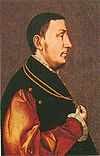
|
5 February 1519 Breda Son of Henry III and Claudia of Chalon |
14 September 1538 – 15 July 1544 | Principality of Orange (1530–44) Barony of Breda (1538–44) |
Anna of Lorraine 22 August 1540 Bar-le-Duc one child |
15 July 1544 Saint-Dizier aged 25 |
Son of Henry III, inherited Nassau-Breda from his father and the Principality of Orange from his mother. He was also Stadtholder in Holland, Zealand and Utrecht (1540-1544).Left no descendants, and gave his patrimony to his cousin. | |
| William I the Silent | 
|
24 April 1533 Dillenburg First son of William I, Count of Nassau-Siegen and Juliane of Stolberg-Wernigerode |
15 July 1544 – 10 July 1584 | Principality of Orange (with Barony of Breda) |
Anna van Egmont 8 July 1551 Buren three children Anna of Saxony 24 August 1561 Leipzig (annulled 14 December 1571) five children Charlotte of Bourbon 12 June 1575 Brielle six children Louise de Coligny 12 April 1583 Antwerp one child |
10 July 1584 Delft aged 51 |
Eldest son of William the Rich, inherited his cousin's lands, and left his father's inheritance to his younger brothers. Also Count of Katzenelnbogen, Vianden, Dietz, Buren and Leerdam and Lord of IJsselstein, Baron of Breda, etc. He was also Stadtholder in Holland, Zeeland and Utrecht (1559-1567 and 1572-1584) and Frisia and Drenthe (1580-1584). Murdered in 1584. | |
| Philip II | 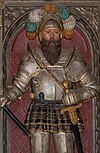
|
25 July 1509 Saarbrücken First son of John Louis and Catherine of Moers-Saarwerden |
4 June 1545 – 19 June 1554 | County of Saarbrücken | Apollonia Catherine of Leiningen-Hartenburg 17 July 1535 no children |
19 June 1554 Strasbourg aged 44 |
Left no descendants. He was succeeded by his brother. | |
| John III | 
|
5 April 1511 Saarbrücken Second son of John Louis and Catherine of Moers-Saarwerden |
19 June 1554 – 23 November 1574 | County of Saarbrücken | Unmarried | 23 November 1574 Saarbrücken aged 63 |
Left no descendants. The land was absorbed by Nassau-Weilburg. | |
| Nassau-Saarbrücken merged again in Nassau-Weilburg | ||||||||
| Philip II the Younger | 
|
1516 Idstein First son of Philip I and Adriana of Glymes |
1554 – 3 January 1566 | County of Idstein (At Wiesbaden 1554-56 and 1564–66) |
Unmarried | 3 January 1566 Wiesbaden-Sonnenberg aged 49 |
Children of Philip I, divided the land. Adolph kept Idstein and Philip inherited Wiesbaden. After Adolph IV's death, Philip II reunited Idstein, but divided it again with another brother, Balthasar. | |
| Adolph IV | 
|
1518 Idstein Second son of Philip I and Adriana of Glymes |
1554 – 5 January 1556 | County of Idstein (At Idstein) |
Franziska of Luxembourg-Brienne (1475-17 June 1566) 19 April 1543 four children |
5 January 1556 Idstein aged 38 | ||
| Albert | 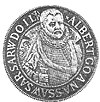
|
26 December 1537 Weilburg Son of Philip III and Anna of Mansfeld-Hinterort |
4 October 1559 – 11 November 1593 | County of Weilburg (at Weilburg proper) |
Anna of Nassau-Dillenburg 23 September 1536 fourteen children |
11 November 1593 Ottweiler aged 55 |
Sons of Philip I, ruled jointly. In 1574 annexed Nassau-Saarbrücken. Philip kept Neuweilnau until his death, which was then reabsorbed in Weilburg. | |
| Philip IV | 
|
14 October 1542 Weilburg Son of Philip III and Amalie of Isenburg-Büdingen |
4 October 1559 – 12 March 1602 | County of Weilburg (at Neuweilnau) |
Erica of Manderscheid-Blankenheim 9 April 1563 one child Elisabeth of Nassau-Dillenburg 3 October 1583 no children |
12 March 1602 Saarbrücken aged 59 | ||
| John VI the Elder | 
|
22 November 1536 Dillenburg Second son of William I, Count of Nassau-Siegen and Juliane of Stolberg-Wernigerode |
6 October 1559 – 8 October 1606 | County of Siegen | Elisabeth of Leuchtenberg 6 June 1559 Dillenburg thirteen children Kunigunde Jakobäa of Palatinate-Simmern 13 September 1580 Dillenburg four children Johannetta of Sayn-Wittgenstein 14 June 1586 Berleburg seven children |
8 October 1606 Dillenburg aged 69 |
Younger brother of William the Silent, inherited his father's domains, which were divided after his own death. Also Stadtholder of Guelders (1578-1581). | |
| Balthasar | 1520 Idstein Third son of Philip I and Adriana of Glymes |
1564 – 11 January 1568 | County of Idstein (with Wiesbaden since 1566) |
Margaret of Isenburg-Birstein (4 December 1542 – 8 August 1613) 9 June/6 September 1564 one child |
11 January 1568 Idstein aged 48 |
Brother of Adolph IV and Philip II. Definitely reunited Idstein. | ||
| Regency of Margaret of Isenburg-Birstein (1568-1587) | ||||||||
| John Louis I | 
|
10 April 1567 Idstein Son of Balthasar and Margaret of Isenburg-Birstein |
11 January 1568 – 10 June 1596 | County of Idstein | Maria of Nassau-Siegen 2 December 1588 Idstein six children |
10 June 1596 Idstein aged 29 | ||
| Philip William | 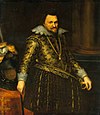
|
19 December 1554 Buren Son of William I and Anna van Egmont |
10 July 1584 – 20 February 1618 | Principality of Orange (with Barony of Breda) |
Éléonore de Bourbon 23 November 1606 Fontainebleau no children |
20 February 1618 Brussels aged 63 |
Left no descendants. He was succeeded by his half-brother Maurice. | |
| Regency of Maria of Nassau-Siegen (1596-1605) | Died as minors. After John Louis' death, his lands were annexed to Nassau-Weilburg. | |||||||
| John Philip | 
|
26 March 1595 Idstein First son of John Louis I and Maria of Nassau-Dillenburg |
20 June 1596 – 29 August 1599 | County of Idstein | Unmarried | 29 August 1599 Idstein aged 4 | ||
| John Louis II | 21 May 1596 Idstein Second son of John Louis I and Maria of Nassau-Dillenburg |
29 August 1599 – 19 June 1605 | County of Idstein | Unmarried | 19 June 1605 Dillenburg aged 9 | |||
| Nassau-Idstein merged again in Nassau-Weilburg | ||||||||
| Anna of Nassau-Siegen | 21 September 1541 Dillenburg Third daughter of William I, Count of Nassau-Siegen and Juliane of Stolberg-Wernigerode |
11 November 1593 – 12 February 1616 | County of Weilburg (at Wehen) |
Albert, Count of Nassau-Weilburg 23 September 1536 fourteen children |
12 February 1616 Weilburg aged 74 |
Heirs of Albert of Weilburg:
Louis reunited all Southern Nassau under Weilburg, but his sons divided it again. | ||
| Louis II | 
|
9 August 1565 Weilburg First son of Albert and Anna of Nassau-Siegen |
11 November 1593 – 19 November 1597 (as count of Ottweiler) 19 November 1597 – 8 November 1627 (as count of Weilburg) |
County of Weilburg | Anna Maria of Hesse-Kassel 8 June 1589 Kassel fourteen children |
8 November 1627 Saarbrücken aged 62 | ||
| William | 25 August 1570 Weilburg Fourth son of Albert and Anna of Nassau-Siegen |
11 November 1593 – 19 November 1597 | County of Weilburg | Erica of Isenburg-Birstein 29 January 1596 Birstein two children |
19 November 1597 Burgschwalbach aged 27 | |||
| John Casimir | 24 September 1577 Ottweiler Fifth son of Albert and Anna of Nassau-Siegen |
11 November 1593 – 29 March 1602 | County of Weilburg (at Gleiberg) |
Elisabeth of Hesse-Darmstadt 10 May 1601 Weilburg one child |
29 March 1602 Wehen aged 24 | |||
| William Louis | 
|
13 March 1560 Dillenburg First son of John VI, Count of Nassau-Siegen and Elisabeth of Leuchtenberg |
8 October 1606 – 13 July 1620 | County of Dillenburg | Anna of Orange-Nassau 25 November 1587 Franeker no children |
13 July 1620 Leeuwarden aged 60 |
Children of John VI, divided the land:
| |
| John VII the Middle | 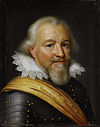
|
7 June 1561 Siegen Second son of John VI and Elisabeth of Leuchtenberg |
8 October 1606 – 27 September 1623 | County of Siegen | Magdalene of Waldeck-Wildungen 9 December 1581 Dillenburg twelve children Margaret of Schleswig-Holstein-Sonderburg 27 August 1603 Dillenburg thirteen children |
27 September 1623 Siegen aged 62 | ||
| George | 
|
1 September 1562 Dillenburg Third son of John VI, Count of Nassau-Siegen and Elisabeth of Leuchtenberg |
8 October 1606 – 9 August 1623 | County of Beilstein (1606–23) County of Dillenburg (1620–23) |
Anna Amalia of Nassau-Saarbrücken 1584 fourteen children Amalia of Sayn-Wittgenstein 1605 one child |
9 August 1623 Dillenburg aged 60 | ||
| Ernest Casimir | 
|
22 December 1573 Dillenburg Sixth son of John VI, Count of Nassau-Siegen and Elisabeth of Leuchtenberg |
8 October 1606 – 2 June 1632 | County of Dietz | Sophia Hedwig of Brunswick-Lüneburg 8 June 1607 Dillenburg two children |
2 June 1632 Roermond aged 58 | ||
| Regency of George II, Count of Sayn-Wittgenstein and John Albert I, Count of Solms-Braunfels (1606-1617) | ||||||||
| John Louis | 
|
6 August 1590 Dillenburg Second son of John VI, Count of Nassau-Siegen and Johannetta of Sayn-Wittgenstein |
8 October 1606 – 10 March 1653 | County of Hadamar (1606–50) Principality of Hadamar (1650–53) |
Ursula of Lippe 1617 fourteen children |
10 March 1653 Hadamar aged 62 | ||
| Elisabeth of Hesse-Darmstadt | 29 November 1579 Darmstadt Second daughter of George I, Landgrave of Hesse-Darmstadt and Magdalene of Lippe |
12 February 1616 – 17 July 1655 | County of Weilburg (at Wehen) |
John Casimir, Count of Nassau-Gleiberg 10 May 1601 Weilburg one child |
17 July 1655 Wehen aged 48 |
Widow of John Casimir, inherited from her mother-in-law her seat at Wehen. At her death, Wehen was inherited by Nassau-Idstein. | ||
| Maurice | 
|
14 November 1567 Dillenburg Second son of William I and Anna of Saxony |
20 February 1618 – 23 April 1625 | Principality of Orange (with Barony of Breda) |
Unmarried | 23 April 1625 The Hague aged 57 |
He was also Stadtholder in Holland, Zeeland and Utrecht (1584-1625), Guelders and Overjissel (1590-1625) and Groningen and Drenthe (1620-1625). Left no descendants. He was succeeded by his half-brother Frederick Henry. | |
| John VIII the Younger | 
|
29 September 1583 Dillenburg Second son of John VII and Magdalene of Waldeck-Wildungen |
27 September 1623 – 27 July 1638 | County of Siegen (Catholic branch) |
Ernestine Yolande de Ligne 13 August 1618 Brussels thirteen children |
27 July 1638 Ronse aged 54 |
Sons of John VII, divided the land once more, this time in religious matters:
| |
| William | 
|
13 August 1592 Dillenburg Fifth son of John VII and Magdalene of Waldeck-Wildungen |
1624 – 17 July 1642 | County of Siegen (Protestant branch, at Hilchenbach) |
Christiane of Erbach 17 January 1619 Siegen seven children |
17 July 1642 Orsoy aged 49 | ||
| John Maurice the Brazilian | 
|
17 June 1604 Dillenburg First son of John VII and Margaret of Schleswig-Holstein-Sonderburg |
1632 – 20 December 1679 | County of Siegen (Protestant branch, 1632–64) Principality of Siegen (Protestant branch, 1664–79) |
Unmarried | 20 December 1679 Kleve aged 75 | ||
| Louis Henry | 
|
9 May 1594 Saarbrücken Sixth son of George and Anna Amalia of Nassau-Saarbrücken |
9 August 1623 – 12 July 1662 | County of Dillenburg (1623–54) Principality of Dillenburg (1654–62) |
Catherine of Sayn-Wittgenstein 1615 twelve children Elizabeth of Salm-Dhaun 1653 no children Sophia Margaretha of Nassau-Hadamar 1656 three children |
12 July 1662 Dillenburg aged 68 |
Sons of George, ruled jointly. | |
| Albert | 
|
1 November 1596 Dillenburg Eighth son of George and Anna Amalia of Nassau-Saarbrücken |
9 August 1623 – 16 June 1626 | County of Dillenburg | Unmarried | 16 June 1626 Quakenbrück aged 29 | ||
| Frederick Henry | 
|
29 January 1584 Delft Son of William I and Louise de Coligny |
23 April 1625 – 14 March 1647 | Principality of Orange (with Barony of Breda) |
Amalia of Solms-Braunfels 4 April 1625 The Hague nine children |
14 March 1647 The Hague aged 63 |
He was also Stadtholder in Holland, Zeeland, Utrecht, Guelders and Overjissel (1625-1647) and Groningen and Drenthe (1640-1647). | |
| William Louis | 18 December 1590 Ottweiler First son of Louis II, Count of Nassau-Weilburg and Anna Maria of Hesse-Kassel |
8 November 1627 – 22 August 1640 | County of Saarbrücken | Anna Amalia of Baden-Durlach 25 November 1615 Durlach twelve children |
22 August 1640 Metz aged 49 |
Children of Louis II, divided the land:
| ||
| John | 
|
24 November 1603 Saarbrücken Seventh son of Louis II, Count of Nassau-Weilburg and Anna Maria of Hesse-Kassel |
8 November 1627 – 23 May 1677 | County of Idstein | Sibylla Magdalena of Baden-Durlach 6 June 1629 Strasbourg nine children Anna of Leiningen-Dagsburg-Falkenburg 6 December 1646 Strasbourg seventeen children |
23 May 1677 Idstein aged 73 | ||
| Ernest Casimir | 15 November 1607 Saarbrücken Eighth son of Louis II and Anna Maria of Hesse-Kassel |
8 November 1627 – 16 April 1655 | County of Weilburg | Anna Maria of Sayn-Wittgenstein-Hachenburg 22 February 1634 Weilburg six children |
16 April 1655 Weilburg aged 47 | |||
| Henry Casimir I | 
|
21 January 1612 Arnhem Fourth son of Ernest Casimir I and Sophie Hedwig of Brunswick-Wolfenbüttel |
2 June 1632 – 13 July 1640 | County of Dietz | Unmarried | 13 July 1640 Hulst aged 28 |
Also Stadtholder in Frisia, Groningen and Drenthe. Left no descendants. He was succeeded by his brother. | |
| Regency of Ernestine Yolande de Ligne (1638-1651) | Had to cede a part of the county to the Protestant branch of the family in 1648. He kept fighting his Protestant neighbours and suppressing the Calvinists in his territory. His reign was marked by bad management and debts. However, in 1652, he was elevated to Imperial Prince. He was also Stadtholder in Limburg (1665-1684) and Upper Guelders (1680-1699). | |||||||
| John Francis Desideratus | 
|
28 July 1627 Nozeroy Son of John VIII and Ernestine Yolande de Ligne |
27 July 1638 – 17 November 1699 | County of Siegen (Catholic branch, 1638–52) Principality of Siegen (Catholic branch, 1652–99) |
Johanna Claudia of Königsegg-Rotenfels-Aulendorf 14 May 1651 Vienna ten children Marie Eleonore Sophie of Baden-Rodemachern 31 May 1665 Rodemachern four children Isabella Clara du Puget de la Serre 9 February 1669 Brussels ten children |
17 November 1699 Roermond aged 72 | ||
| William Frederick | 
|
7 August 1613 Arnhem Fourth son of Ernest Casimir I and Sophie Hedwig of Brunswick-Wolfenbüttel |
13 July 1640 – 31 October 1664 | County of Dietz (1632–54) Principality of Dietz (1654–64) |
Albertine Agnes of Orange-Nassau 2 May 1652 Kleve three children |
31 October 1664 Leeuwarden aged 51 |
Also Stadtholder in Frisia (1640-1664), Groningen and Drenthe (1650-1664). | |
| Regency of Anna Amalia of Baden-Durlach (1638-1642) | Anna Amalia exerted regency of her son Crato, and, after his death, took the County of Saarwerden, while regent in the name of her second son in Saarbrücken. After her death, Saarwerden reunited with Saarbrücken. In 1659, John Louis divided the land with his other brothers, in which he received Ottweiler. Count of Nassau-Saarbrücken and (1659–80) in Ottweiler, Jungenheim, and Wöllstein. Between 1677 and 1680 he also served as regent for Count John Ernest of Nassau-Weilburg. | |||||||
| Crato | 7 April 1621 Second son of William Louis, Count of Nassau-Saarbrücken and Anna Amalia of Baden-Durlach |
22 August 1640 – 25 July 1642 | County of Saarbrücken | Unmarried | 25 July 1642 | |||
| Anna Amalia of Baden-Durlach | 9 July 1595 Durlach Second daughter of George Frederick, Margrave of Baden-Durlach and Juliana Ursula of Salm-Neuville |
25 July 1642 – 18 November 1651 | County of Saarbrücken (at Saarwerden) |
William Louis, Count of Nassau-Saarbrücken 25 November 1615 Durlach twelve children |
18 November 1651 Saarbrücken aged 56 | |||
| Regency of Anna Amalia of Baden-Durlach (1642-1651) | ||||||||
| John Louis | 23 May 1625 Saarbrücken Third son of William Louis, Count of Nassau-Saarbrücken and Anna Amalia of Baden-Durlach |
25 July 1642 – 1659 | County of Saarbrücken | Dorothea Catherine of Palatinate-Bischweiler 6 October 1649 Bischweiler eight children |
9 February 1690 Reichelsheim aged 64 | |||
| 1659 – 9 February 1690 | County of Ottweiler | |||||||
| William II | 
|
27 May 1626 The Hague Son of Frederick Henry and Amalia of Solms-Braunfels |
14 March 1647 – 6 November 1650 | Principality of Orange (with Barony of Breda) |
2 May 1641 London one child |
6 November 1650 The Hague aged 24 |
He was also Stadtholder in Holland, Zeeland, Utrecht, Guelders, Overjissel, Groningen and Drenthe. | |
| Mary of Great Britain | 4 November 1631 Westminster, London First daughter of Charles I of England and Henrietta Maria of France |
6 November 1650 – 24 December 1660 | Barony of Breda | 24 December 1660 Westminster, London aged 29 |
Given her inherited seat in Breda, she may have had the entire hereditary barony, which passed then to her son. | |||
| Regencies of Mary of Great Britain (1650-1660) and Amalia of Solms-Braunfels (1650-1672) | Also Stadtholder in Holland, Zeeland and Utrecht (1672-1702), Guelders and Overjissel (1675-1702), and Drenthe (1696-1702). Became King of England and Scotland (Great Britain) in 1688, jointly with his wife. Left no descendants. He named his cousin John William Friso of Nassau-Dietz as his heir in The Netherlands and the principality of Orange, passing over the claims of the Hohenzollerns of Brandenburg/Prussia. | |||||||
| William III | 
|
4 November 1650 The Hague Son of William II and Mary of Great Britain |
6 November 1650 – 8 March 1702 | Principality of Orange (with Barony of Breda from 1660) |
Mary II, Queen of Great Britain 4 November 1677 Kensington, London no children |
8 March 1702 London aged 51 | ||
| Principality of Orange (and Breda) inherited by Nassau-Dietz | ||||||||
|
In 1702, the Nassau-Dietz branch followed the House of Orange that had become extinct with William III of England (d. 1702). The counts of Nassau-Dietz not only descended from William the Silent's brother, but in female line also from himself, as William Frederick, Prince of Nassau-Dietz, had married Countess Albertine Agnes of Nassau, the fifth daughter of Frederick Henry, Prince of Orange in 1652. | ||||||||
| Maurice Henry | 
|
23 April 1626 Hadamar Son of John Louis and Ursula of Lippe |
10 March 1653 – 24 January 1679 | Principality of Hadamar | Ernestine Charlotte of Nassau-Siegen 30 January 1650 Siegen six children Maria Leopoldine of Nassau-Siegen 12 August 1669 Siegen three children Anna Louise of Manderscheid-Blankenheim 24 October 1675 Hachenburg six children |
24 January 1679 Hadamar aged 52 |
||
| Frederick | 26 April 1640 Metz Son of Ernest Casimir and Anna Maria of Sayn-Wittgenstein-Hachenburg |
16 April 1655 – 8 September 1675 | County of Weilburg | Christiane Elisabeth von Sayn-Wittgenstein-Homburg 26 May 1663 three children |
8 September 1675 Weilburg aged 35 |
|||
| Gustav Adolph | 
|
27 March 1632 Saarbrücken Fifth son of William Louis, Count of Nassau-Saarbrücken and Anna Amalia of Baden-Durlach |
1659 – 9 October 1677 | County of Saarbrücken | Eleonora Clara of Hohenlohe-Neuenstein 14 June 1662 seven children |
9 October 1677 Strasbourg aged 45 |
Brothers of John Louis of Nassau-Saarbrücken (who retired to rule Ottweiler only), they divided the land: Gustav kept Saarbrücken, and Waleran inherited Usingen. | |
| Walrad | 
|
25 February 1635 Roermond Seventh son of William Louis, Count of Nassau-Saarbrücken and Anna Amalia of Baden-Durlach |
1659 – 17 October 1702 | County of Usingen (1659–88) Principality of Usingen (1688-1702) |
Catherine Françoise of Croÿ-Roeulx 16 June 1678 Mechelen three children Magdalena Elizabeth of Löwenstein-Wertheim-Rochefort 1686 no children |
17 October 1702 Usingen aged 66 | ||
| Henry | 28 August 1641 Dillenburg Son of George Louis, Heir of Dillenburg and Anna Augusta of Brunswick-Wolfenbüttel |
12 July 1662 – 18 April 1701 | Principality of Dillenburg | Dorothea Elizabeth of Brzeg 13 October 1663 sixteen children |
18 April 1701 Ludwigsbrunn im Tiergarten aged |
Henry was a grandson of Louis Henry, as son of George Louis, Heir of Nassau-Dillenburg. Adolph, son of Louis Henry, ruled at Holzappel and Schaumburg. Adolph passed his fief to his youngest daughter. | ||
| Adolph | 
|
23 January 1629 Dillenburg Son of Louis Henry and Catherine of Sayn-Wittgenstein |
12 July 1662 – 19 December 1676 | Principality of Dillenburg (at Schaumburg) |
Elisabeth Charlotte, Countess of Holzappel 1653 eight children |
19 December 1676 Hadamar aged 47 | ||
| Regency of Albertine Agnes of Orange-Nassau (1664-1677) | Also Stadtholder in Frisia, Groningen and Drenthe. | |||||||
| Henry Casimir II | 
|
18 January 1657 The Hague Son of William Frederick and Albertine Agnes of Orange-Nassau |
31 October 1664 – 25 March 1696 | Principality of Dietz | Henriëtte Amalia of Anhalt-Dessau 26 November 1683 Dessau nine children |
25 March 1696 Leeuwarden aged 39 | ||
| Regencies of John, Count of Nassau-Idstein (1675-1677) and John Louis, Count of Nassau-Ottweiler (1677-1680) | ||||||||
| John Ernest | 
|
13 June 1664 Weilburg Son of Frederick and Christiane Elisabeth of Sayn-Wittgenstein |
8 September 1675 – 27 February 1719 | County of Weilburg | Maria Polyxena of Leiningen-Dagsburg-Hartenburg 3 April 1683 nine children |
27 February 1719 Heidelberg aged 54 | ||
| Regency of Elisabeth Charlotte, Countess of Holzappel (1676-1690) | Youngest daughter of Adolf, was his heiress to the lordship of Schuaumburg, which through her marriage was inherited by Anhalt. | |||||||
| Charlotte | 28 September 1673 Northrhine-Westphalia Sixth daughter of Adolph and Elisabeth Charlotte, Countess of Holzappel |
19 December 1676 – 31 January 1700 | Principality of Dillenburg (at Schaumburg) |
Lebrecht, Prince of Anhalt-Zeitz-Hoym 12 April 1692 Schaumburg five children |
31 January 1700 Bernburg aged 27 | |||
| Schaumburg annexed to Anhalt-Bernburg-Schaumburg-Hoym | ||||||||
| Louis Crato | 
|
28 March 1663 Saarbrücken First son of Gustav Adolph and Eleonora Clara of Hohenlohe-Neuenstein |
9 October 1677 – 14 February 1713 | County of Saarbrücken | Philippine Henriette of Hohenlohe-Langenburg 25 April 1699 eight children |
14 February 1713 Saarbrücken aged 49 |
Left no male descendants. He was succeeded by his brother Charles Louis. | |
| George August | 
|
26 February 1665 Idstein Son of John and Anna of Leiningen-Dagsburg |
23 May 1677 – 26 October 1721 | County of Idstein (1677–88) Principality of Idstein (1688-1721) |
Henriette Dorothea of Oettingen 22 September 1688 Kirchheim unter Teck twelve children |
26 October 1721 Biebrich aged 66 |
||
| Nassau-Idstein was annexed by Nassau-Saarbrücken | ||||||||
| Regency of Francis Bernard of Nassau-Hadamar (1679-1694) | Left no surviving descendants, and his lands were divided by Nassau-Siegen, Nassau-Dillenburg and Nassau-Diez in 1717. | |||||||
| Francis Alexander | 
|
27 January 1674 Hadamar Son of Maurice Henry and Maria Leopoldine of Nassau-Siegen |
24 January 1679 – 27 May 1711 | Principality of Hadamar | Elizabeth Catherine Felicitas of Hesse-Rotenburg 18 October 1695 Lovosice (annulled 1705) fourteen children |
27 May 1711 Hadamar aged 37 | ||
| Nassau-Hadamar divided between Nassau-Dietz, Nassau-Dillenburg and Nassau-Siegen | ||||||||
| William Maurice | 
|
18/28 January 1649 Terbog |
20 December 1679 – 23 January 1691 | Principality of Siegen (Protestant branch) |
Ernestine Charlotte of Nassau-Schaumburg 6 February 1678 Schaumburg two children |
23 January 1691 Siegen aged 41/42 |
||
| Regency of Ernestine Charlotte of Nassau-Schaumburg (1691-1701) | ||||||||
| Frederick William Adolf | 
|
20 February 1680 Siegen Son of William Maurice and Ernestine Charlotte of Nassau-Schaumburg |
23 January 1691 – 13 February 1722 | Principality of Siegen (Protestant branch) |
Elisabeth Juliana Francisca of Hesse-Homburg 7 January 1702 five children Amalie Louise of Courland 13 April 1708 eight children |
13 February 1722 Siegen aged 41 | ||
| Regency of Henriëtte Amalia of Anhalt-Dessau (1696-1708) | In 1702 became the heir of William III of Orange and thus the founder of the younger House of Orange-Nassau and of the Dutch royal family. However, he had to split the Dutch properties with the King of Prussia who also descended from William I. Also Stadtholder in Frisia and Groningen. | |||||||
| John William Friso | 
|
14 August 1687 Dessau Son of Henry Casimir II and Henriëtte Amalia of Anhalt-Dessau |
25 March 1696 – 14 July 1711 | Principality of Dietz (as Nassau-Dietz, 1696–1702; as Orange-Nassau, 1702–11) Principality of Orange Barony of Breda (as Orange-Nassau, 1702–11) |
Marie Louise of Hesse-Kassel 26 April 1709 Kassel two children |
14 July 1711 Hollands Diep aged 23 | ||
| William Hyacinth | 
|
3 April 1667 Brussels Son of John Francis Desideratus and Eleonore Sophie of Baden-Rodemachern |
17 December 1699 – 18 February 1743 | Principality of Siegen (Catholic branch) |
Maria Francisca of Fürstenberg-Heiligenberg 9 April 1687 Liège three children Maria Anna Josepha of Hohenlohe-Schillingsfürst 22 May 1698 Frankfurt one child Sophia of Starhemberg 28 July 1740 Vienna no children |
18 April 1743 Hadamar aged 76 |
Son of John Francis Desideratus. Mismanaged the government of the principality and was removed from executive power 1707–1740. He inherited 1/6 of Nassau-Hadamar in 1711 and 1/2 of Nassau-Dillenburg in 1739. He ceded his part of Nassau-Dillenburg to William IV of Orange-Nassau in 1742 and received the latter's part of Nassau-Hadamar in return. He was succeeded by William IV of Orange-Nassau. | |
| William II | 
|
28 August 1670 Dillenburg Second son of Henry and Dorothea Elizabeth of Brieg |
18 April 1701 – 21 September 1724 | Principality of Dillenburg | Johanna Dorothea of Schleswig-Holstein-Sonderburg-Plön-Norburg 13 January 1699 Harzgerode two children |
21 September 1724 Dillenburg aged 54 |
Left no surviving descendants. He was succeeded by his brother. | |
| William Henry | 
|
2 May 1684 's-Hertogenbosch Son of Walrad and Catherine Françoise of Croÿ-Roeulx |
17 October 1702 – 14 February 1718 | Principality of Usingen | Charlotte Amalia of Nassau-Dillenburg 15 April 1706 Dillenburg nine children |
14 February 1718 Usingen aged 33 |
||
| Regency of Marie Louise of Hesse-Kassel (1711-1729) | Inherited a number of Nassau territories besides his paternal Nassau-Dietz.[6] He reunited all of the German possessions of the Ottonian Line of his family in his hand, renaming his county Nassau-Dillenburg, and styling himself Prince of Orange and Nassau. Also Stadtholder in Frisia and Groningen (1711-1747), Drenthe and Guelders (1722-1747) and Overjissel (1747). In 1747 reunited all the Stadtholderates under his rule, becoming the first Hereditary Stadtholder. | |||||||
| William IV | 
|
1 September 1711 Leeuwarden Son of John William Friso and Marie Louise of Hesse-Kassel |
1 September 1711 – 22 October 1751 | Principality of Orange (in Barony of Breda only from 1713) Principality of Dietz (as Orange-Nassau) |
Anne of Great Britain 25 March 1734 London three children |
22 October 1751 The Hague aged 40 | ||
| In 1713, Orange was annexed to France. From 1713, the use of the title was merely nominal | ||||||||
| Charles Louis | 
|
6 January 1665 Saarbrücken Second son of Gustav Adolph and Eleonora Clara of Hohenlohe-Neuenstein |
14 February 1713 – 6 December 1723 | County of Saarbrücken | Christiane Charlotte of Nassau-Ottweiler 22 April 1713 Saarbrücken two children |
6 December 1723 Idstein aged 58 |
Left no descendants. The land went to his cousin from Nassau-Ottweiler. | |
| Charles August | 
|
17 September 1685 Weilburg Son of John Ernest and Maria Polyxena of Leiningen-Hardenburg |
27 February 1719 – 9 November 1753 | County of Weilburg | Augusta Friederike of Nassau-Idstein 17 August 1723 Wiesbaden seven children |
9 November 1753 Weilburg aged 68 |
||
| Regency of Amalie Louise of Courland (1722-1726) | Left no surviving male descendants. After his death (which determined the extinction of the line) in 1734, Emperor Charles VI transferred the Protestant county of Nassau-Siegen to the House of Orange-Nassau as the inheritors. | |||||||
| Frederick William | 
|
11 November 1706 Siegen Son of Frederick William Adolf and Elisabeth Juliana Francisca of Hesse-Homburg |
13 February 1722 – 2 March 1734 | Principality of Siegen (Protestant branch) |
Sophie Polyxena Concordia of Sayn-Wittgenstein-Hohenstein 23 September 1728 five children |
11 November 1734 Siegen aged 27 | ||
| Nassau-Siegen was annexed by Nassau-Dillenburg and Nassau-Dietz | ||||||||
| Frederick Louis | 
|
13 November 1651 Ottweiler Son of John Louis and Dorothea Catherine of Palatinate-Birkenfeld-Bischweiler |
9 February 1690 – 6 December 1723 | County of Ottweiler | Christiane van Ahlefeldt 28 July 1680 eight children Louise Sophie of Hanau-Lichtenberg 27 September 1697 no children |
25 May 1728 Saarbrücken aged 76 |
Count of Nassau-Ottweiler (1680–1728), in Rixingen (1703–28), Idstein (1721–28), and in Wiesbaden, etc. (1723–28). In 1723 inherited Saarbrücken, reuniting Ottweiler with the newly inherited land. After his death, Saarbrücken briefly mergen with Nassau-Usingen. | |
| 6 December 1723 – 25 May 1728 | County of Saarbrücken | |||||||
| Nassau-Ottweiler merged again in Nassau-Saarbrücken | ||||||||
| Christian | 
|
12 August 1688 Dillenburg Eighth son of Henry and Dorothea Elizabeth of Brieg |
21 September 1724 – 28 August 1739 | Principality of Dillenburg | Isabella Charlotte of Nassau-Dietz 1725 no children |
28 August 1739 Straßebersbach aged 51 |
Left no surviving descendants and his lands were inherited by Nassau-Dietz and catholic Nassau-Siegen. | |
| Nassau-Dillenburg was inherited by Orange-Nassau (Nassau-Dietz) and catholic Nassau-Siegen | ||||||||
| Regency of Charlotte Amalia of Nassau-Dillenburg (1718-1734) | Sons of William Henry. Charles was the only heir, but in 1741 he divided the inheritance, and gave Saarbrücken to his brother (raised as a principality), and retained Usingen. | |||||||
| Charles | 
|
31 December 1712 Usingen First son of William Henry, Prince of Nassau-Usingen and Charlotte Amalia of Nassau-Dillenburg |
14 February 1718 – 21 June 1775 | Principality of Usingen | Christine Wilhelmine of Saxe-Eisenach 26 December 1734 four children Magdalene Gross of Wiesbaden after 1740 (morganatic) four children |
21 June 1775 Biebrich aged 62 | ||
| William Henry | 
|
6 March 1718 Usingen Second son of William Henry, Prince of Nassau-Usingen and Charlotte Amalia of Nassau-Dillenburg |
1735 – 24 July 1768 | Principality of Saarbrücken | Sophie Erdmuthe of Erbach-Erbach 28 February 1742 Erbach five children |
24 July 1768 Saarbrücken aged 50 | ||
| Regencies of Anne of Great Britain (1751-1759, Marie Louise of Hesse-Kassel (1759-1765), Louis Ernest, Duke of Brunswick-Bevern (1759-1766) and Carolina of Orange-Nassau (1765-1766) | Also Hereditary Stadtholder of the Netherlands. | |||||||
| William V | 
|
8 March 1748 The Hague Son of William IV and Anne of Great Britain |
22 October 1751 – 9 April 1806 | Principality of Dietz (with Barony of Breda;as Orange-Nassau) |
Wilhelmina of Prussia I 4 October 1767 Berlin five children |
9 April 1806 Braunschweig aged 58 | ||
| Charles Christian | 
|
16 January 1735 Weilburg Son of Charles August and Augusta Friederike of Nassau-Idstein |
9 November 1753 – 28 November 1788 | County of Weilburg | Carolina of Orange-Nassau 5 March 1760 The Hague fifteen children Barbara Giessen 2 October 1788 (morganatic) no children |
28 November 1788 Münster-Dreissen aged 53 |
||
| Louis | 
|
3 January 1745 Saarbrücken Son of William Henry and Sophie Erdmuthe of Erbach-Erbach |
24 July 1768 – 2 March 1794 | Principality of Saarbrücken | Wilhelmine of Schwarzburg-Rudolstadt 30 October 1766 Schwarzburg one child Katharina Kest 28 February 1787 (morganatic, legitimized 1787) seven children |
2 March 1794 Aschaffenburg aged 49 |
||
| Charles William | 
|
9 November 1735 Usingen First son of Charles and Christine Wilhelmine of Saxe-Eisenach |
21 June 1775 – 17 May 1803 | Principality of Usingen | Caroline Felizitas of Leiningen-Dagsburg 16 April 1760 one child |
17 May 1803 Biebrich aged 67 |
Left no descendants. He was succeeded by his brother. | |
| In 1783, the heads of various branches of the House of Nassau sealed the Nassau Family Pact (Erbverein) to regulate future succession in their states, and to establish a dynastic hierarchy whereby the Prince of Orange-Nassau-Dietz was recognised as President of the House of Nassau.[7] | ||||||||
| Henry Louis | 
|
9 March 1768 Saarbrücken Son of Louis and Wilhelmine of Schwarzburg-Rudolstadt |
2 March 1794 – 27 April 1797 | Principality of Saarbrücken | Marie Françoise Maximilienne of Saint Mauris-Montbarrey 6 October 1785 no children |
27 April 1797 Cadolzburg (aged 29) |
After his death Nassau-Saarbrücken was occupied by France. | |
| Nassau-Saarbrücken was annexed by France | ||||||||
| Frederick Augustus | 
|
23 April 1738 Usingen Second son of Charles and Christine Wilhelmine of Saxe-Eisenach |
17 May 1803 – 24 March 1816 | Principality of Usingen | Louise of Waldeck and Pyrmont 9 June 1775 seven children |
24 March 1816 Wiesbaden aged 77 |
From 1806 ruled jointly. Frederick William retained the title of Prince of Nassau, and Frederick Augustus maintained his title of Duke. | |
| 30 August 1806 – 24 March 1816 | Duchy of Nassau | |||||||
| Nassau-Usingen united with Nassau-Weilburg to form the Duchy of Nassau | ||||||||
| Frederick William | 
|
25 October 1768 The Hague Son of Charles Christian and Carolina of Orange-Nassau |
28 November 1788 – 9 January 1816 | County of Weilburg | Louise Isabelle of Kirchberg 31 July 1788 Hachenburg four children |
9 January 1816 Weilburg aged 47 | ||
| 30 August 1806 – 9 January 1816 | Duchy of Nassau | |||||||
| Nassau-Weilburg united with Nassau-Usingen to form the Duchy of Nassau | ||||||||
| William VI | 
|
24 August 1772 The Hague Son of William V and Wilhelmina of Prussia I |
9 April – 12 July 1806 19 October 1813 – 31 May 1815 |
Principality of Dietz (with Barony of Breda;as Orange-Nassau) |
Wilhelmina of Prussia II 1 October 1791 Berlin six children Henrietta d'Oultremont 17 February 1841 (morganatic) no children |
12 December 1843 Berlin aged 71 |
Ascended 9 April 1806, and on 27 October his lands were annexed to the Duchy of Nassau. He revived the Principality of Orange-Nassau, but in 1815 was proclaimed King of the Netherlands. His Nassau lands returned to the Duchy of Nassau. See List of monarchs of the Netherlands for extended information on the descendants of William. | |
| In 1806 (and then again in 1815), Dietz and Breda were annexed to the Duchy of Nassau | ||||||||
| William | 
|
14 June 1792 Kirchheimbolanden Son of Frederick William, Prince of Nassau-Weilburg and Louise Isabelle of Kirchberg |
9 January 1816 – 24 March 1816 (as Prince of Weilburg) 24 March 1816 – 20 August 1839 (as Duke of Nassau) |
Duchy of Nassau | Louise of Saxe-Hildburghausen 24 June 1814 Weilburg eight children Pauline of Württemberg 23 April 1829 Stuttgart four children |
20/30 August 1839 Kissingen aged 47 |
||
| Adolph | 
|
24 July 1817 Wiesbaden Son of William and Louise of Saxe-Hildburghausen |
20 August 1839 – 20 September 1866 | Duchy of Nassau | Elizabeth Mikhailovna of Russia 31 January 1844 St. Petersburg no children Adelheid-Marie of Anhalt-Dessau 23 April 1851 Dessau five children |
17 November 1905 Lenggries aged 88 |
In 1866 lost his Nassau lands, but he was granted in 1890 the Grand Duchy of Luxembourg after the death of his 17th cousin without male descendants. See List of monarchs of Luxembourg for extended information on the descendants of Adolph. | |
| In 1866, Nassau was annexed to the Kingdom of Prussia | ||||||||
Nassau's successor states
[edit]Kings and Queens of the Netherlands (from the House of Orange-Nassau-Dietz)
[edit]
- 1815–1840: William I, also Duke and Grand Duke of Luxemburg and Duke of Limburg
- 1840–1849: William II, also Grand Duke of Luxemburg and Duke of Limburg
- 1849–1890: William III, also Grand Duke of Luxemburg and Duke of Limburg
- 1890–1948: Wilhelmina
Following defunct German laws that no longer have relevance due to the end of German nobility, the House of Orange-Nassau(-Dietz) has been extinct since the death of Wilhelmina (1962). Dutch laws and the Dutch nation do not consider it extinct.
- 1948–1980: Juliana
- 1980–2013: Beatrix
- 2013-present: Willem-Alexander
Grand Dukes of Luxembourg (from the House of Nassau-Weilburg)
[edit]
- 1890–1905: Adolphe
- 1905–1912: William IV
- 1912–1919: Marie-Adélaïde, succession through a female onwards
- 1919–1964: Charlotte
- 1964–2000: Jean
- 2000–present: Henri
See also
[edit]References
[edit]- ^ a b Abramson, Scott F. (2017-01-01). "The Economic Origins of the Territorial State". International Organization. 71 (1): 97–130. doi:10.1017/S0020818316000308. ISSN 0020-8183.
- ^ Renaming came with the inheritance of the Principality of Orange by René of Nassau-Breda, heir of the Barony of Breda.
- ^ Despite being one of the main Ottonian successors of the original County of Nassau, the County of Siegen restarts the counting of Henrys, which doesn't happen, for example, with the names Waleran or Rupert in the Walramian line, which see its counting continued in following divisions.
- ^ Actually it is known that Adolph was a minor at the time of his succession, but it's not stated anywhere who was his regent
- ^ (in German) RI XIII H. 5 n. 149 in: Regesta Imperii Online.
- ^ Namely 1/3 of Nassau-Hadamar in 1711, Protestant Nassau-Siegen in 1734, and 1/2 of Nassau-Dillenburg in 1739. In 1732, Frederick William I of Prussia left him his Dutch properties, including Huis ten Bosch palace and Het Loo Palace. He also ceded his part of Hadamar to William Hyacinth of Nassau-Siegen (1742), received the latter's part of Nassau-Dillenburg, and then succeeded him in his possessions (1743).
- ^ Hay, Mark Edward (1 June 2016). "The House of Nassau between France and Independence, 1795–1814: Lesser Powers, Strategies of Conflict Resolution, Dynastic Networks". The International History Review. 38 (3): 482–504. doi:10.1080/07075332.2015.1046387. S2CID 155502574.


